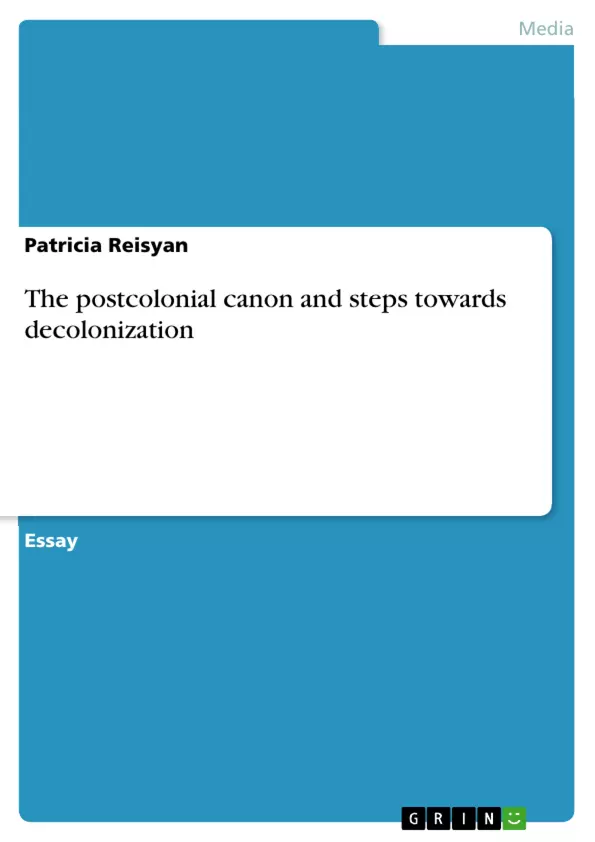This paper takes a postcolonial perspective on the existing canon of art history and examines to what extent the low representation of non-European and non-North American arts is a continuity of European colonial times and which steps could contribute to decolonizing the canon.
Postcolonial research asks how colonial rule and domination have manifested themselves in science, politics, economics, literature, art, law, popular culture, and everyday contexts and continue to have an impact into our present. There’s no dispute that the prefix "post" does not refer to a final status, but to continuity.
The topic is gaining ever more increased relevance resulting from current globalization processes and the accompanying internationalization of art, which pose new challenges to art history, art criticism and exhibitions. Thus, in recent years, the European art system has begun to self-reflect on its own art historical canonization in distinction to possible other art histories and to modify its criteria of exclusion and inclusion for canonization in such a way that a – still limited but – constantly growing number of artists from the formerly colonized territories are now represented. Nevertheless, in Germany, colonial history seems to be only hesitantly recognized as part of general education, and also the art historical discourse in Germany shows comparatively little interest in the international and interdisciplinary debates on postcolonialism. Due to the fact that German art history still remains largely silent on postcolonial questions, and that the German government did not recognize the colonial crimes in present-day Namibia as genocide until 2021, voices of activists of color are growing louder; and it shows the need for further debate.
Inhaltsverzeichnis (Table of Contents)
- Introduction
- Canon and Canonization
- Colonialism and its impact on the Canon
- Coloniality and Othering
- Marginalization of non-European art
- Specific marginalization of African art
- Decolonization of the Canon
- Conclusion
Zielsetzung und Themenschwerpunkte (Objectives and Key Themes)
This paper explores the underrepresentation of non-European and non-North American art within the established art historical canon from a postcolonial perspective. It seeks to understand how colonial rule and its strategies of "othering" have contributed to this imbalance and to identify potential steps towards decolonizing the canon. The paper aims to contribute to the ongoing debate about the canon's inclusivity and the need for a more nuanced and equitable representation of artistic practices from diverse cultural backgrounds.
- The impact of colonialism on the formation and maintenance of the art historical canon
- The role of "othering" in marginalizing non-European art
- The persistence of structural racism in the postcolonial context
- The need for a decolonization of the canon to achieve greater inclusivity and representation
- The challenges and opportunities associated with decolonizing the art historical canon
Zusammenfassung der Kapitel (Chapter Summaries)
- Introduction: This chapter provides an overview of the paper's focus on the postcolonial perspective of the art historical canon and its underrepresentation of non-European art. It highlights the ongoing relevance of postcolonial research and the increasing attention given to the topic in light of globalization and internationalization of art. The chapter emphasizes the need for further debate on colonial history and its impact on art history in Germany.
- Canon and Canonization: This chapter defines the term "canon" and its process of "canonization," emphasizing the role of institutions in selecting and defining what is considered valuable and worth preserving. It discusses the inherent judgmental character of the canon and its role in establishing and maintaining hegemonic rule through mechanisms of exclusion and inscribed relations of dominance. The chapter further explores the ongoing debates about the canon and its potential revision in the context of social reorientation and the increasing voices of marginalized groups.
- Colonialism and its impact on the Canon: This chapter examines the relationship between colonialism and the art historical canon, highlighting how European colonial rule and its strategy of "othering" have contributed to the marginalization of non-European art. It explores the specific ways in which the art of colonized territories has been excluded from the canon and the implications of this exclusion for the representation of diverse artistic practices.
Schlüsselwörter (Keywords)
This paper explores the postcolonial perspective on the art historical canon, specifically focusing on the underrepresentation of non-European art, coloniality, "othering", structural racism, decolonization, and the need for a more inclusive and equitable representation of artistic practices from diverse cultural backgrounds.
- Quote paper
- Patricia Reisyan (Author), 2022, The postcolonial canon and steps towards decolonization, Munich, GRIN Verlag, https://www.hausarbeiten.de/document/1473415


